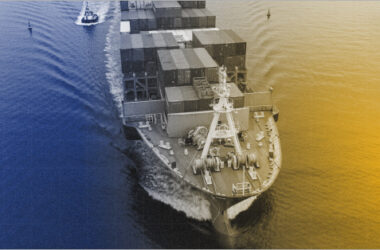Marine Insurance Policies typically cover a wide range of risks, including damage to cargo, loss of cargo, damage to the ship, and liability for third-party claims. The level of coverage provided by a Marine Insurance Policy will depend on the specific needs of the business and the risks associated with their cargo. In Marine Insurance, freight is typically insured separately from the cargo.
Freight is a critical component of Marine Insurance, and it refers to the cost of transporting goods from one location to another by sea. The term encompasses all charges incurred during the transportation of goods, including loading, unloading, and handling fees. Freight is calculated based on the weight, volume, and nature of the cargo, as well as the distance between the ports of departure and arrival. The loss or damage of cargo during transit can result in significant financial losses, and freight insurance can help mitigate these risks.
Freight in Marine Insurance: An Overview
Freight can be calculated in several ways, depending on the terms of the shipping contract. In some cases, freight may be calculated based on the weight or volume of the goods being transported. In other cases, freight may be calculated based on the value of the goods, or a combination of these factors. The terms of the shipping contract will determine how freight is calculated and what factors are considered. Again, who will pay freight to the government collecting agency?
Freight is typically insured along with the goods being transported. This means that if the goods are lost or damaged during transit, the insurance policy will cover the value of both the goods and the freight. A freight insurance policy protects companies that have legal responsibility for goods, such as freight forwarders and carriers. The freight forwarder pays this insurance, but the sender/customer pays it when the forwarder’s service is used. Such insurance is usually included in the sender’s shipping quote and then included in the sender’s payment.
Key Features of Freight in Marine Insurance
- Freight is a separate and distinct element of the contract of carriage and is usually negotiated separately from the cost of the goods being transported.
- The freight rate is determined by several factors, including the type of cargo, the distance travelled, and the mode of transport.
- In Marine Insurance, freight is usually insured against the risk of loss or damage during transport, just like the cargo itself.
- The carrier is responsible for delivering the cargo to its destination in good condition, and any loss or damage to the cargo or freight during transport is usually covered by the Marine Insurance Policy.
- In some cases, the carrier may be liable for additional costs associated with the loss or damage of the cargo or freight, such as demurrage or detention charges.
- In the event of a claim, the insured must provide proof of the loss or damage, as well as the value of the cargo and freight, to receive compensation from the insurer.
Overall, freight is an important element of Marine Insurance, and carriers and shippers alike should ensure that they have adequate coverage in place to protect against the risks of loss or damage during transport.
Importance of Freight in Marine Insurance
The higher the value of the goods being transported, the higher the freight, and thus, the higher the premium.
It is also important because it affects the limit of liability for the carrier. The carrier’s liability is limited to the value of the goods being transported, including the freight. Therefore, if the freight is high, the carrier’s liability will also be high.
In addition, freight is used to determine the contribution of each cargo owner to the general average. General average is a principle of maritime law that requires all parties involved in a voyage to share the losses incurred during the voyage. The contribution of each cargo owner is based on the value of their cargo, including the freight.
It is important for cargo owners to understand the importance of freight in Marine Insurance and to ensure that the correct value of freight is declared when obtaining insurance coverage. Failure to declare the correct value of freight can result in underinsurance, which can have serious financial consequences in the event of a loss.
How Freight is Calculated in Marine Insurance
The calculation of freight in Marine Insurance is based on several factors.
The first factor is the mode of transportation used for the shipment. Whether the shipment is transported by sea, air, or land, the freight charges will vary accordingly. For example, the freight charges for a shipment transported by sea will be different from the charges for a shipment transported by air.
The second factor is the weight and volume of the shipment. Freight charges are often calculated based on the weight or volume of the shipment, whichever is higher. This is because carriers have limited space on their vessels or aircraft, and they charge based on the amount of space the shipment occupies.
The third factor is the distance between the origin and destination of the shipment. The farther the distance, the higher the freight charges will be. This is because carriers must cover the cost of fuel, labor, and other expenses associated with transporting the shipment over a longer distance.
In addition to these factors, other charges may be included in the calculation of freight, such as handling charges, customs duties, and insurance charges. It is important to note that the calculation of freight charges in Marine Insurance can be complex, and it is recommended that shippers consult with their insurance provider to ensure that they have adequate coverage for their shipment.
Claims and Compensation in Freight Marine Insurance
When it comes to freight Marine Insurance, claims, and compensation are important aspects to consider. In case of any damage or loss to the cargo, the insurer will need to compensate the insured for the value of the goods lost or damaged. The compensation amount is usually determined by the terms of the insurance policy and the value of the goods at the time of the loss or damage. It’s important to note that the compensation amount may not always be equal to the full value of the goods insured.
In some cases, the insurer may choose to repair or replace the damaged goods, instead of paying out a cash compensation. This is known as “making good” the loss, and it’s a common practice in Marine Insurance.
It’s also important to note that the insured has a responsibility to mitigate any losses as much as possible. This means taking reasonable steps to prevent further damage or loss to the cargo and providing the insurer with all necessary information and documentation to support the claim. In cases where the loss or damage was caused by a third party, the insurer may seek to recover the compensation amount from the responsible party. This is known as subrogation, and it allows the insurer to recover some, or all the compensation paid out to the insured. Overall, claims and compensation in Freight Marine Insurance can be complex and require careful consideration of the insurance policy terms and conditions. It’s important for both the insured and the insurer to work together to ensure a fair and timely resolution of any claims.
Conclusion
Freight insurance is a type of Marine Insurance that specifically covers the value of the cargo being transported. It is essential for businesses that rely on shipping to move their products, as it provides financial protection against unforeseen events such as accidents, piracy, and natural disasters. It helps to mitigate the risks associated with transporting goods by sea and gives peace of mind to both cargo owners and carriers. Protecting against the risks of loss and damage during transit helps to ensure the smooth operation of supply chains and the continued success of businesses around the world. Speak to our experts for the best assistance.
Frequently Asked Questions
1. What do we mean by the term freight?
In the mid-1500s, freight became fraught, meaning “to load.” In the 1530s, freight became a freight train, meaning to transport.
2. What are the various types of freight?
In the world of freight shipping, there are four major types of transportation available to shippers. Ground transportation (road), rail transportation, ocean shipping, and air transportation are the major modes. However, each method differs in its own way in its processes.
3. Freight is an expense, right?
A freight expense is the cost of transporting goods from one location to another that is charged by a carrier. The expense is paid by the person who wants the goods transported.








